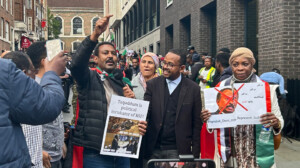Sudan witnesses various protests over the weekend
In Port Sudan, capital of Red Sea state, people demonstrated against the increased electricity fees and the dire services in the city, while port workers announced a strike. People in Kordofan complain about continuing shortages of fuel. Teachers in Kassala organised a vigil against the replacement of the state Minister of Education. Ethiopian refugees protested the change of status in Khartoum.
 Port workers on strike in Port Sudan (Social media)
Port workers on strike in Port Sudan (Social media)
Sudan witnessed various protests over the weekend. In Port Sudan, capital of Red Sea state, people demonstrated against the increased electricity fees and the dire services in the city, while port workers announced a strike. People in Kordofan complain about continuing shortages of fuel. Teachers in Kassala organised a vigil against the replacement of the state Minister of Education. Ethiopian refugees protested the change of their status in Khartoum.
Residents of El Safa neighbourhood in Port Sudan organised a vigil in front of the General Secretariat of the Red Sea state government on Sunday, denouncing the high electricity fees.
One of them told Radio Dabanga that the costs of connecting electricity to a house are SDG120,000* which exceeds the capabilities of the families in the neighbourhood.
He said that the Red Sea state governor promised to talk with the protesters.
Resistance Committees active in the neighbourhoods of Port Sudan condemned the deterioration of water and power services, and the continuing transportation crisis in the city.
They demand the dismissal of the head of the Transportation and Petroleum Administration, the completion of the Port Sudan electricity project, and the establishment of a Red Sea state transportation police unit.
In North, South, and West Kordofan, people are suffering from a serious transportation crisis because of the continuing fuel shortages.
The North Kordofan capital of El Obeid was entirely devoid of vehicles yesterday. In Delling in the northern part of South Kordofan, the growing fuel crisis caused an 60-100 per cent increase in transport tariffs.
Strike, quotas
In Port Sudan, the Ports Workers Union announced a strike for a period of three days, starting today.
In a statement on Sunday, the union’s steering committee renewed its refusal to privatise the Res Sea state ports, and demanded that the Port Authority be represented in the Legislative Council to be established in the coming months.
The union further demands to be considered the sole representative of the workers, and calls for the approval of the proposed job structure and bonuses.
The Ports Authority had frozen the work of the union’s steering committee due to the presence of more than one party representing workers.
The Staff Association of the Sea Ports Authority announced on Sunday that the Red Sea state Minister of Finance agreed to add bonuses to all personnel for the second semester within the incentives and grants in line with the terms of service of the Sea Ports Authority.
On Sunday as well, dozens of teachers in Kassala organised a protest in front of the state government secretariat against the replacement of the director of the Kassala Ministry of Education. They denounced “the use of quotas” in appointing state officials.

Status
Dozens of Ethiopian refugees organised a protest in front of the United Nations High Commissioner for Refugees (UNHCR) office in Khartoum, demanding the return of the refugee status.
One of the refugees said that the authorities have replaced their status as refugees by that of asylum seekers.
He explained that the change has an impact on their safety, education, and health care. Since they lost their refugee status, they are for instance not allowed anymore to work, to buy subsidised bread in various neighbourhoods, and to sit for exams and enrol in universities.
He said that many of the more than 11,000 Ethiopian refugees in Sudan arrived in the country decades ago.
* USD 1 = SDG 55 at the time of publishing this article. As effective foreign exchange rates can vary widely in Sudan, Radio Dabanga bases all SDG currency conversions on the daily middle US Dollar rate quoted by the Central Bank of Sudan (CBoS). On the Khartoum parallel market, the greenback sold for SDG 268 on Tuesday last week.
Radio Dabanga’s editorial independence means that we can continue to provide factual updates about political developments to Sudanese and international actors, educate people about how to avoid outbreaks of infectious diseases, and provide a window to the world for those in all corners of Sudan. Support Radio Dabanga for as little as €2.50, the equivalent of a cup of coffee.












 and then
and then